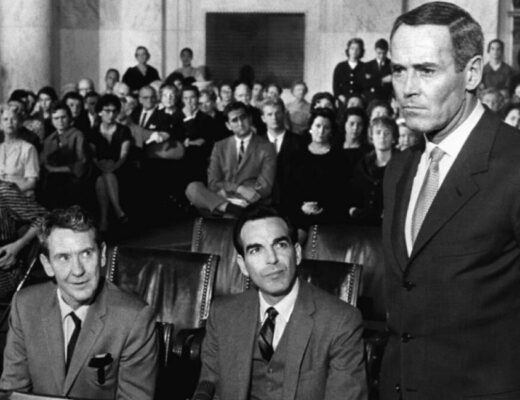Billie Eilish
“Do you know me?” Billie Eilish asks listeners at about the half-way point on her ironically-titled sophomore release, Happier Than Ever. She sounds dejected, almost defeated; she then proceeds to ask the question again, this time more vexingly: “Really know me?” Her voice, now distorted, is flat, yet her vocal’s resolve and prosaic lyricism firmly situates the song’s tension around the one-sided nature of parasocial relationships. She points out how people have opinions on her opinions, on her clothes, how she presents herself, how she dresses — she also makes an astute observation that even if you’re supposedly “on her side,” if you’re a grown adult, that’s still super weird — which makes the opening inquiry’s tone all the more acidic. One could reasonably compare this spoken-word interlude (“Not My Responsibility”) with another sonic respite of sorts: Radiohead’s “Fitter Happier,” which used a synthesised voice application to achieve the same numbing, fourth-wall breaking effect. But that track ended after a few minutes, and had SimpleText’s Fred vocalizing and authenticating a distanced affect; Eilish doesn’t allow listeners the ability to tune out after a few minutes, as she verbally accosts them over her brother’s routinely minimal production.
On an album that’s thematically defined by power dynamics — more specifically, about figures of authority abusing their control and influence within a cultural industry that’s predicated on exploiting young talent — this is a moment of self-reclamation, a more didactic one amidst some of the more anxious sentiments expressed elsewhere. Opener “Getting Older” serves as the introductory statement of sorts for the rest of the album: the track’s gentle, plodding synth beat is sparse and reserved, with Eilish’s vocals sounding frail and vulnerable — she laments both growing up and growing up in the public’s scrupulous eye, the crushing isolation that comes with newfound fame (“Which is ironic ’cause the strangers seem to want me more / Than anyone before”), and the personal trauma, usually inflicted by older men, that seems to accompany women as they enter into adulthood. It’s a lot to take in, all gracefully balanced across a pensive tempo — then a pitbull’s rabid growling crashes through, straight into “I Didn’t Change My Number.” It’s a devilish move that would have suited the Eilish’s siblings’ last studio album more naturally — which only makes sense on a track that’s more in tune with their last record’s sensibilities as well, with Billie vocally sashaying around the ensuing barking.
This, “Therefore I Am,” “Lost Cause” (a track practically constructed around the idea of “what if we only had a bass guitar in the mix?”), and mischievous “NDA” — with it’s puckish violin strings plucking away — all pace themselves and fall into similar rhythms as the songs on When We All Fall Asleep, Where Do We Go?, but that’s about all those two records share on a compositional level. The remaining tracks vary in terms of musical genres (MPB on “Billie Bossa Nova”; acoustic folk on “Your Power”) and production styles (the stuttering vocal sample that comprises the beat of “Goldwing”), often radically swaying between these diverse modes with a sequencing order seemingly created to infuriate with how nonuniform it appears to operate. Undoubtedly, this is a result of the album’s slow roll-out, starting all the way back in mid-2020 with “My Future” — but what results is a constant work-in-progress that suits the arrested development of its central performer, one that’s somehow both sonically comprehensive while also concentrating its intimate songwriting efforts around a single individual’s affected experiences. On the beautiful, melancholic “Halley’s Comet,” the re-occurrence of a passing nebular mass turns into a play on words for how emotionally available one is; and on the album’s title track — which keeps building in intensity, with its drums banging louder and louder — she reverses the sentiment wholesale (“Just fuckin’ leave me alone”) against a lover who didn’t have time for her mom and now talks shit about her on the internet. In a sense, this takes us back to the first penetrating question, or at the bare minimum re-contextualizes it: “Do you know me?” Eilish, here once again, proves there’s plenty she and her brother still have yet to reveal.
Writer: Paul Attard Section: Pop Rocks

Credit: Adrian Nieto
Clairo
When the world was first introduced to Clairo, talk most immediately fell to whether or not she was an industry plant, the then 19-year-old songwriter/producer swiftly rising to prominence off lo-fi pop single “Pretty Girl” in 2017 and its accompanying, cutesy, faux-candid video. The video’s well-timed riff on e-girl aesthetics, combined with knowledge of the musician’s parentage (her dad is a pretty elite marketing exec) made it easy for many to assume the most cynical (and probably correct) stance on the suddenly ubiquitous Clairo. Four years on, this nonscandal has mostly evaporated thanks to loyal stans and high-profile cosigns, most notably from Rostam Batmanglij who co-produced her first full-length album Immunity in 2019. This officially cemented Clairo as someone who was OK for big music press to consider (she played Pitchfork Music Festival that same year), but Immunity wasn’t a particularly exciting debut album, essentially redressing the sound teased on “Pretty Girl” with some expensive contemporary production flourishes and Rostam guitar solos (Danielle Haim showed up to play drums on a few tracks as well to further shore up clout).
Nevertheless, Immunity was generally nicely received, and Clairo’s pull amongst young TikTok and YouTube users has persisted, so here she is now with a new Jack Antonoff-produced album (inevitably) entitled Sling. Unsavory as he is, it’s hard to deny Antonoff’s savvy as a producer of female vocalists, recent St. Vincent project Daddy’s Home representing the sole dud in a multi-year hot streak that has found him assembling excellent records for Lana, Lorde, and so on. Sling is a pretty good Antonoff production, certainly not a cringey goof-up like Daddy, yet not quite an artist-defining work like Melodrama or Norman Fucking Rockwell. Clearly a more inspiring collaborator than Rostam, who mostly sidled up alongside Clairo’s existing sonic preferences, Antonoff has actively pushed and inspired her languid, bedroom pop proclivities toward a robust, warmer sound that maintains the disenchanted tone of the music that’s come before. Making use of a stock of instruments similar to those used on Daddy’s Home (Wurlitzer piano, woodwind horns, analog synths), though with different genre and aesthetic aim, Sling recasts Clairo as something in between cosmopolitan lounge singer and woodsy folk act, placing her hushed, over-enunciated vocals alongside each other in multi-part harmony over acoustic strumming and clarinet. Clairo and Antonoff paint a chilly, late-autumn scene (the time of year at which it was recorded in fact) informed by the latter’s cool keys, occasionally pulled into the warmth of jazzy drum rhythms and bass lines. As a lyricist, Clairo continues to work toward a more refined poeticism, with the writing on Sling representing her strongest offering yet, a good balance of evocative phrasing and direct casual comment.
But despite the new aesthetic upgrade, Clairo is still covering about the same thematic territory that she trod through on Immunity, entangling the existential with mundane conflict. Now 23 and four years into a thriving music career, the songs on Sling introduce a very slightly matured Clairo now contending with the usual industry woes (opener “Bambi”), as well as thoughts of not-so-far off parenthood (“Zinnias,” containing the lyric from which the album derives its name: “Let the real estate show itself to me / I could wake up with a baby in a sling”). Apparently inspired by her dog Joanie (for whom a 5-minute instrumental is named, a credible flex of musicianship) whose vulnerability has inspired Clairo to reevaluate the merits of a quiet, domestic life (a narrative that’s been obsessively reiterated throughout the album’s press cycle), these new considerations don’t really overcomplicate the project at hand, which still makes room to touch on youthful disaffection (bossanova-y second single “Amoeba”) and glamorously inert relationship drama (lead single “Blouse”), pulling them together into something cohesive, if not a little rote by the time things wind down at the 44-minute mark. Seemingly a very conscious step toward maturity, Sling ends up successful in this regard, but maybe too much so, some of these compositions teetering on the edge of self-seriousness; music that could fit right into a Woody Allen movie. Nevertheless, that’s more interesting than what appeared on Immunity or throughout Clairo’s singles work, and Sling also gives her room to wield the full breadth of her vocal range to a degree previously unexpected and unexperienced. Not everything has quite lined up yet, but Sling at least confirms Clairo to be working toward something grander and more ornate.
Writer: M.G. Mailloux Section: Ledger Line
Soulja Boy
OK, hear me out: Soulja Boy’s Big Draco is the rapper’s The Life of Pablo, period. Not in terms of quality, mind you; this is functionally identical to any number of mixtapes the rapper’s dropped since 2016, all seemingly self-produced with a clear minimal amount of effort put into each product. Not that anyone has been demanding a fully robust project from a now 31-year-old Soulja, but with the occasional moments of Internet virility he’s still able to amass — usually at the behest of some other entity he’s claiming stole something from him, whether it be Tyga, Drake, and now Atari — and what usually follows is a predictable wave of radio and Internet interviews, where the question of new music eventually pops up (as if that’s the reason he’s there to speak) to be later answered by releases like Big Draco. True, it has been incredible to watch DeAndre Cortez resurrect his career twice over now by pure meme life-support — albeit in ways that he’s completely squandered and never once capitalized on, especially on the music side of things. What pushes Soulja’s new albums (this is first official since 2015) isn’t an interest in musicality, or even in basic artistry: what we’re here for is a continuation of his social media presence, for him to rant again about how he had the biggest comeback when he objectively didn’t, for him to claim he was the first rapper to do everything and anything (he sorta does so half-heartedly on closer “I Was the First Rapper,” as if he’s already tired of this bit), and to once again diss the U.S. Army as imperialist cowards.
He doesn’t really do that on Big Draco, but it’s that kitschy, self-referential quality that gives it the feeling of Pablo (plus there’s an appearance by Desiigner, for good measure) — especially on the bombastic “Bow Wow vs. Soulja Boy,” which serves as a sequel of sorts to the Verzuz battle the two engaged in earlier in the year. There’s zero reference to the occurrence here, and there’s not even the slightest mention of their ongoing beef over the years — it’s pure vibes, plain and simple. Which… sure, why not. But it’s also that sense of general indifference that plagues the album, making it lack the tenacity of Soulja’s more recent Twitch-stream rantings and ravings. On “10 Girls In The Lobby,” he and guest Omarion attempt to project as both devilish and amorous, just boys being boys type shit; the results are lame and listless, with Soulja singing in auto-tune with little to no clear melody detected. There’s not even the sense that he wants to be here, like the man is perfectly content with only being famous for being famous (which… yeah, probably true). He performs on cue, but with no passion or concern; he’s happy the spotlight is still on him, and that’s all that truly matters at this point anyway.
Writer: Paul Attard Section: What Would Meek Do?

Credit: Carlotta Kohl
Bleachers
After a highly collaborative 4 years, Jack Antonoff’s solo project Bleachers returns with Take the Sadness Out of Saturday Night, a melancholy pop take on his signature Springsteen worship that the previous two records had drawn significant attention for in recent years. It’s almost odd to see Antonoff delving back into his solo work after the last half decade, with production collabs on albums from Lorde, Kevin Abstract, Lana Del Rey, and, of course, his ongoing working relationship with Taylor Swift. While several of these artists have hit all-time career highs under this partnership, Antonoff tends to draw some criticism for relying on the same production sounds on each of these projects: a lazy kick drum beat to carry whole tracks, repetitive hooks, and a whole lot of slap echo. And while these sonic mainstays are certainly all present on Take the Sadness Out of Saturday Night, there are a smattering of “new to Antonoff” choices that prevent the album from sliding into full-blown bore territory.
An artist known for artistic alliances, it shouldn’t surprise that Antanoff’s latest record boasts some major team-ups. “Chinatown” features none other than Bruce Springsteen himself, effectively bringing master to student. Elsewhere, Zadie Smith offers a surprising vocal contribution on opening track “91,” while Lana Del Rey provides backing vocals on “Secret Life.” But the issue with each of these collaborations is that they scan more as a song belonging to the featured artist than a unique Bleachers sound (most notably on “Chinatown,” which operates more as a Magic-era Springsteen track than anything Antonoff has touched before). This marks the biggest issue with Bleachers on the whole and this specific album: there is very rarely evinced a sound that isn’t a direct rip of a significantly more talented artist. Heroes are evident, with huge swings toward the sounds of Vampire Weekend, Mountain Goats, early Arcade Fire, and a number of other artists in the same vein. There’s no reason this can’t work in theory, artists being inspired by artists and all, but with every track here sounding like a pale imitation of its obvious inspiration, the returns are especially diminishing. And in practice, when every track is a swing, the law of batting averages means the misses will be many. That’s not to say the album is in any way unlistenable, as the songs go down smoothly enough on their own merits, but the very evident contrast is vivid and inescapable.
When Jack Antonoff started Bleachers, he described the project as a way to look at the morose feelings of a suburban life, with sonic influence “halfway between Disclosure and Arcade Fire.” While this is technically achieved in many ways, it also seems notable that the project’s genesis was defined with a description of other artists, and that is precisely what Take the Sadness Out of Saturday Night feels like: an album describing (musically) what other, better artists sound like. Despite this cribbing as content, there manages to be a few foot-tap worthy tracks to enjoy along the way, as Antanoff’s “signature” is rarely dull. But in keeping with the overarching reality of his career, the collaborations are the real highlight.
Writer: Andrew Bosma Section: Ledger Line
Yves Tumor
It hasn’t been such a long time since we last heard from Yves Tumor, who spent last year enjoying much-deserved praise for their fourth studio album, Heaven to a Tortured Mind, which launched the elusive experimental electronic/industrial producer into full rock star mode. Heaven prioritized pop hooks and big guitar solos, while embracing glam and psych aesthetics, opening up new possibilities for Tumor as a vocalist and a performer. Not necessarily an artist who keeps to one, definitive style for too long, their latest project, The Asymptotical World EP, suggests that Tumor has more to explore in this territory.
Arriving with only a day’s forewarning, The Asymptotical World was announced via a music video for the album’s sole single (and opening track) “Jackie,” with the 6-song EP manifesting across the Internet and streaming services 24 hours later. “Jackie” essentially picks up right where Tumor left off on Heaven to a Tortured Mind, asserting themself once again as glam deity, riding fuzzed out guitar riffs with snarling confidence and a melodic drawl of surprising range. Something of a post-break up depression anthem, “Jackie”’s music video sets the action in a dystopian sci-fi landscape that might be at home as the artwork for some forgotten prog album, by way of Melancholia. If not just a cool aesthetic, this video manages to get at the project enacted on both Heaven and this new EP; locating the intersections and overlaps between a particular era of American rock music, and then blurring the distinction between them. “Crushed Velvet” (track 2) continues down the same path “Jackie” set out on, bringing in Prince-type funk in homage to the fabric for which the song is named, before switching up into drawn out post-punk jam “Secrecy Is Incredibly Important to the Both of Them.” From there, The Asymptotical World diverges into “Tuck,” a collaboration with performance art/noise duo NAKED, followed then the shoegazey “…And Loyalty Is a Nuisance Child,” change ups that lead into one another organically, confidently following an internal logic. As such, The Asymptotical World works nicely as a sort of addendum to Heaven to a Tortured Mind, offering 6 tracks of comparable quality that stretches that album’s sound in some new directions without surpassing it.
Writer: M.G. Mailloux Section: Ledger Line







